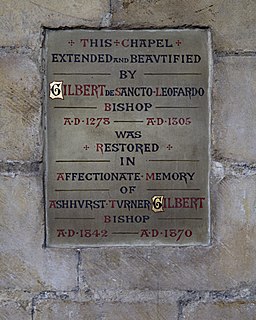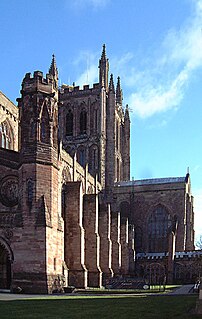Related Research Articles

Robert Kilwardby was an Archbishop of Canterbury in England and a cardinal. Kilwardby was the first member of a mendicant order to attain a high ecclesiastical office in the English Church.
Robert Burnell was an English bishop who served as Lord Chancellor of England from 1274 to 1292. A native of Shropshire, he served as a minor royal official before entering into the service of Prince Edward, the future King Edward I of England. When Edward went on the Eighth Crusade in 1270, Burnell stayed in England to secure the prince's interests. He served as regent after the death of King Henry III of England while Edward was still on crusade. He was twice elected Archbishop of Canterbury, but his personal life—which included a long-term mistress who was rumoured to have borne him four sons—prevented his confirmation by the papacy. In 1275 Burnell was elected Bishop of Bath and Wells, after Edward had appointed him Lord Chancellor in 1274.
Robert Winchelsey was an English Catholic theologian and Archbishop of Canterbury. He studied at the universities of Paris and Oxford, and later taught at both. Influenced by Thomas Aquinas, he was a scholastic theologian.
Silvester de Everdon was a medieval Bishop of Carlisle and Lord Chancellor of England.
Henry Wingham was a Lord Chancellor of England and Bishop of London.
Walter Giffard was Lord Chancellor of England and Archbishop of York.
William de Wickwane was Archbishop of York, between the years 1279 and 1285.
John le Romeyn, died 1296, was a medieval Archbishop of York.
Thomas of Corbridge was Archbishop of York between 1299 and 1304.
John Blund was an English scholastic philosopher, known for his work on the nature of the soul, the Tractatus de anima, one of the first works of western philosophy to make use of the recently translated De Anima by Aristotle and especially the Persian philosopher Avicenna's work on the soul, also called De Anima. He taught at Oxford University along with Edmund of Abingdon. David Knowles said that he was "noteworthy for his knowledge of Avicenna and his rejection of the hylomorphism of Avicebron and the plurality of forms.", although the problem of the plurality of forms as understood by later scholastics was not formulated explicitly in Blund's time. Maurice Powicke calls him the "first English Aristotelian."
Seffrid I, sometimes known as Seffrid Pelochin, was a medieval Bishop of Chichester.
John of Greenford was a medieval Bishop of Chichester.
Simon of Wells was a medieval Bishop of Chichester.
Ranulf of Wareham was a medieval Bishop of Chichester.
John Climping was a medieval Bishop of Chichester.

Gilbert de St Leonard was a medieval Bishop of Chichester.
Hugh Foliot was a medieval Bishop of Hereford. Related somehow to his predecessor at Hereford, he served as a priest and papal judge as well as being an unsuccessful candidate as Bishop of St David's in Wales. In 1219, he was appointed Bishop of Hereford. During his time in office, he mostly attended to ecclesiastical duties, but did occasionally serve as a royal administrator. He helped found a hospital and a priory, and died in 1234 after a months-long illness.

Richard Swinefield was a medieval Bishop of Hereford, England. He graduated doctor of divinity before holding a number of ecclesiastical offices, including that of Archdeacon of London. As a bishop, he dedicated considerable efforts to securing the canonisation of Thomas de Cantilupe, his predecessor, for whom he had worked during his lifetime. Active in his diocese, he devoted little time to politics. He was buried in Hereford Cathedral where a memorial to his memory still stands.
Richard of Gravesend was a medieval Bishop of Lincoln.
Henry of Sandwich was a medieval Bishop of London.
References
- Fryde, E. B.; Greenway, D. E.; Porter, S.; Roy, I. (1996). Handbook of British Chronology (Third revised ed.). Cambridge, UK: Cambridge University Press. ISBN 0-521-56350-X.
- Greenway, Diana E. (1996). "Bishops". Fasti Ecclesiae Anglicanae 1066-1300. Vol. 5: Chichester. Institute of Historical Research. Retrieved 20 October 2007.
- Knowles, Clive H. (2004). "Bersted, Stephen (b. before 1220, d. 1287)". Oxford Dictionary of National Biography. Oxford University Press. doi:10.1093/ref:odnb/2228 . Retrieved 27 November 2007.(subscription or UK public library membership required)
- Moorman, John R. H. (1955). Church Life in England in the Thirteenth Century (Revised ed.). Cambridge, UK: Cambridge University Press. OCLC 213820968.
- Prestwich, Michael (2005). Plantagenet England 1225–1360. Oxford, UK: Oxford University Press. ISBN 978-0-19-922687-0.